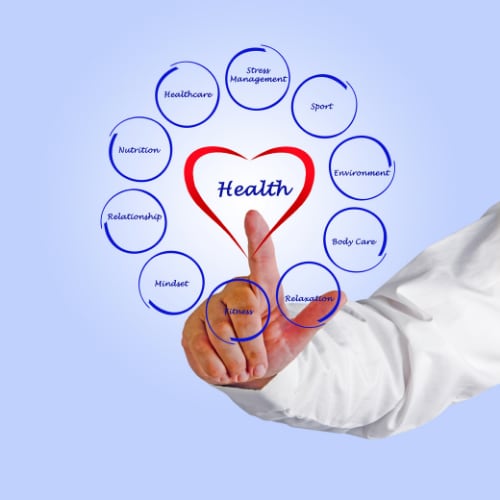 Think
Think
Think

-
Main Ideas
Learning Objective
Understand how thoughts influence physical and mental health, and learn strategies for using mindfulness and positive thinking to improve overall well-being.
Behavioral Objective
Incorporate mindfulness practices and positive thinking exercises into daily life to enhance emotional resilience, reduce stress, and support overall health.
Key Thought
The power of our thoughts can shape our health and happiness. By cultivating mindfulness and positivity, we can create a healthier, more balanced life.
-
Main Ideas
Learning Objective
Understand how thoughts influence physical and mental health, and learn strategies for using mindfulness and positive thinking to improve overall well-being.
Behavioral Objective
Incorporate mindfulness practices and positive thinking exercises into daily life to enhance emotional resilience, reduce stress, and support overall health.
Key Thought
The power of our thoughts can shape our health and happiness. By cultivating mindfulness and positivity, we can create a healthier, more balanced life.
-
Terms
- Cognitive-Behavioral Therapy (CBT)
noun
A type of psychotherapy that helps individuals change negative thought patterns and behaviors to improve emotional and mental health.
- Gratitude Journaling
noun
The practice of regularly writing down things you are grateful for. It enhances positive thinking, improves mood, and reduces stress.
- Mindfulness
noun
The practice of focusing one's awareness on the present moment while calmly acknowledging and accepting one's feelings, thoughts, and bodily sensations.
- Neural Plasticity
noun
The brain's ability to change and adapt in response to experience. This includes alterations in the brain's structure, function, and organization as individuals learn new skills, gain knowledge, or recover from injuries.
- Neuroendocrine Immune System
noun
An interconnected network involving the nervous, endocrine, and immune systems that work together to maintain balance and respond to internal and external stressors. This system plays a key role in managing stress, fighting infections, and regulating essential physiological functions throughout the body.
- Neuroplasticity
noun
The brain's ability to reorganize itself by forming new neural connections throughout life. It enables the brain to adapt, learn, and recover from injury.
- Neurotrophic Factor
noun
A group of proteins vital for the growth, survival, and maintenance of neurons. They support nerve cell development, repair damaged neurons, and enhance neuroplasticity, playing a key role in maintaining and adapting the nervous system throughout life.
- Placebo Effect
noun
A phenomenon where a person experiences real improvements in health or well-being due to their belief in the effectiveness of a treatment, even if the treatment has no therapeutic value.
- Positive Affirmations
noun
Statements that you repeat to yourself to reinforce positive beliefs and self-empowerment. They can help shift negative thought patterns and build confidence.
- Positive Expectancy
noun
The belief that positive outcomes are possible, which can influence health and well-being by promoting optimism and encouraging healthy behaviors.
- Somatic Symptom Disorder
noun
A condition characterized by excessive focus on physical symptoms that cause distress, often without a clear medical cause. It highlights the connection between mental and physical health.
- Stress Resilience
noun
The ability to effectively manage and recover from stress. It involves mental, emotional, and physical strategies to cope with life's challenges.
- Visualization
noun
A mental technique involving the creation of images or scenarios in the mind to enhance focus and achieve personal goals.
-
Terms
- Cognitive-Behavioral Therapy (CBT)
noun
A type of psychotherapy that helps individuals change negative thought patterns and behaviors to improve emotional and mental health.
- Gratitude Journaling
noun
The practice of regularly writing down things you are grateful for. It enhances positive thinking, improves mood, and reduces stress.
- Mindfulness
noun
The practice of focusing one's awareness on the present moment while calmly acknowledging and accepting one's feelings, thoughts, and bodily sensations.
- Neural Plasticity
noun
The brain's ability to change and adapt in response to experience. This includes alterations in the brain's structure, function, and organization as individuals learn new skills, gain knowledge, or recover from injuries.
- Neuroendocrine Immune System
noun
An interconnected network involving the nervous, endocrine, and immune systems that work together to maintain balance and respond to internal and external stressors. This system plays a key role in managing stress, fighting infections, and regulating essential physiological functions throughout the body.
- Neuroplasticity
noun
The brain's ability to reorganize itself by forming new neural connections throughout life. It enables the brain to adapt, learn, and recover from injury.
- Neurotrophic Factor
noun
A group of proteins vital for the growth, survival, and maintenance of neurons. They support nerve cell development, repair damaged neurons, and enhance neuroplasticity, playing a key role in maintaining and adapting the nervous system throughout life.
- Placebo Effect
noun
A phenomenon where a person experiences real improvements in health or well-being due to their belief in the effectiveness of a treatment, even if the treatment has no therapeutic value.
- Positive Affirmations
noun
Statements that you repeat to yourself to reinforce positive beliefs and self-empowerment. They can help shift negative thought patterns and build confidence.
- Positive Expectancy
noun
The belief that positive outcomes are possible, which can influence health and well-being by promoting optimism and encouraging healthy behaviors.
- Somatic Symptom Disorder
noun
A condition characterized by excessive focus on physical symptoms that cause distress, often without a clear medical cause. It highlights the connection between mental and physical health.
- Stress Resilience
noun
The ability to effectively manage and recover from stress. It involves mental, emotional, and physical strategies to cope with life's challenges.
- Visualization
noun
A mental technique involving the creation of images or scenarios in the mind to enhance focus and achieve personal goals.
Introduction
The mind is an incredible tool that shapes our emotions, behaviors, and physical health. Understanding how to utilize our thoughts to promote well-being is key to maintaining a healthy lifestyle. Explore the profound impact of thoughts on our physiological state and discover practical strategies for cultivating positive thinking and mindfulness to enhance overall health and happiness.
Understanding the Thinking Brain
The mind is a powerful tool that shapes our emotions and physical health. Our thoughts influence our physiology through complex interactions within the neuroendocrine-immune system-a network that links the brain, hormones, and immune responses. Understanding how to harness the power of our thinking brain can lead to profound improvements in our mental and physical well-being. By cultivating positive thoughts, mindfulness, and intentional focus, we can foster happiness, hope, and resilience, ultimately enhancing our overall health and quality of life.
Our thoughts are more than fleeting experiences; they are the foundation of our mental and physical states. The brain constantly processes information, and how we think can promote health or contribute to disease. The phrase "we become what we think about most of the time," attributed to Earl Nightingale, highlights the profound impact of thoughts on our lives. This concept is not merely philosophical; it is grounded in science. Thoughts can activate or suppress certain genes, influence the production of neurotransmitters, and even affect our immune system. By understanding and directing our thought patterns, we can cultivate a mindset that supports overall well-being.
The Concept of Mindfulness
Mindfulness, a transformative practice, involves paying attention to the present moment without judgment. It is the practice of observing our thoughts, feelings, and sensations with a sense of curiosity and acceptance. This state of awareness allows us to step back from automatic reactions and choose more constructive responses. Mindfulness has been shown to enhance brain plasticity, support emotional regulation, and improve stress resilience. It bridges the conscious and subconscious mind, enabling us to reshape negative thought patterns and promote a positive mental state.
By practicing mindfulness, we can manage our mental activity more effectively, reducing stress and its harmful effects on the body. This is particularly important because chronic stress is linked to various health issues, including hypertension, cardiovascular disease, and weakened immunity. Through mindful practices, we can create a state of mental calm that supports physical healing and optimal health, empowering us to take control of our well-being.
Physiological Effects of Mindfulness
Mindfulness directly impacts the body's physiological processes. It has been shown to reduce the levels of stress hormones like cortisol, balance the autonomic nervous system, and enhance heart rate variability-a marker of cardiovascular health and stress resilience. Additionally, mindfulness can influence gene expression by promoting beneficial epigenetic changes, such as those that enhance immune function and reduce inflammation. Regular mindfulness practice has also been linked to improved mental health, reduced symptoms of anxiety and depression, and better outcomes in chronic disease management. This scientific evidence reassures us of the tangible benefits of mindfulness.
Research has demonstrated that mindfulness can positively affect DNA methylation and telomere length, both associated with aging and disease. This suggests that mindfulness not only supports mental health but also has a tangible impact on cellular aging, potentially slowing the progression of age-related conditions and improving longevity.
Integrating Thought with Physiology
Thoughts can alter the brain's physical structure through a process known as neuroplasticity. Neuroplasticity is the brain's ability to reorganize itself by forming new neural connections throughout life. This means how we think can change the brain, enhancing the areas responsible for focus, memory, and emotional regulation. Regular mental exercises, such as visualization, meditation, and cognitive training, can strengthen these brain areas, demonstrating the tangible benefits of mental activity on overall brain health.
The mind-body connection is further illustrated by the influence of thoughts on the immune system. Positive thoughts and emotions can enhance immune function, while chronic negative thinking and stress can suppress it, making the body more susceptible to illness. By consciously choosing thoughts that promote hope, gratitude, and positivity, we can support a robust immune response and improve our overall health.
Guiding Thoughts for Better Health
Learning to guide our thoughts is akin to training a muscle. Just as physical exercise strengthens the body, mental exercise strengthens the mind. Practices such as gratitude journaling, positive affirmations, and visualization can condition the mind to focus on constructive, health-promoting thoughts. These practices boost mental well-being and translate into physical health benefits, such as reduced inflammation, improved heart health, and enhanced resilience to stress.
The Role of Positive Expectancy
Positive expectancy-the belief that good things are possible-can have a powerful impact on health outcomes. Research shows that individuals with a positive outlook are more likely to engage in healthy behaviors, recover faster from illness, and experience lower stress levels. This is partly due to the placebo effect, where the expectation of healing can trigger real physiological changes in the body. By cultivating a mindset of positive expectancy, we can enhance the effectiveness of our health interventions and improve overall well-being.
The Impact of Thought on Chronic Conditions
For those managing chronic conditions, the mind can be both a barrier and a tool for healing. Negative thought patterns, such as catastrophizing or helplessness, can exacerbate symptoms and reduce the effectiveness of treatment. Conversely, adopting a proactive and hopeful mindset can improve treatment adherence, reduce symptom severity, and enhance quality of life. Cognitive-behavioral therapy (CBT) and mindfulness-based stress reduction (MBSR) are effective strategies for reshaping thought patterns and improving outcomes in chronic disease management.
Practical Strategies for Cultivating Positive Thought
- Practice Gratitude: Begin or end each day by writing down three things you are grateful for. This simple practice can shift your focus from negative to positive, enhancing mental and emotional well-being.
- Use Positive Affirmations: Repeating positive statements such as "I am healthy and strong" or "I am capable of overcoming challenges" can rewire the brain to focus on strength and resilience.
- Visualize Success: Spend a few minutes each day visualizing yourself achieving your goals, whether they are related to health, work, or personal growth. Visualization activates the brain's reward centers, reinforcing positive behaviors.
- Meditate Regularly: Even a few minutes of daily meditation can calm the mind, reduce stress, and improve mental clarity. Focus on your breath or a positive word to center your thoughts and enhance relaxation.
- Challenge Negative Thoughts: When negative thoughts arise, question their validity and replace them with more balanced, constructive perspectives. This helps break the cycle of negative thinking and promotes emotional resilience.
Final Thoughts
Our thoughts have the power to shape our reality. By cultivating mindfulness, positive expectancy, and constructive thinking patterns, we can create a mental environment that supports physical health, emotional well-being, and overall life satisfaction. Embrace the power of your mind to guide your health journey and unlock the full potential of your well-being.
Daily Gratitude Journaling
Objective: Develop a habit of positive thinking and improve mental well-being by practicing gratitude.
Activity:
- Set aside 5-10 minutes each day to write down three things you are grateful for.
- These can be simple things, such as a beautiful sunrise, a kind gesture, or a personal accomplishment.
- Reflect on why you are grateful for each item and how it positively impacts your life.
- Review your gratitude journal at the end of each week to see the cumulative positive effect on your mindset and mood.
Guided Meditation for Stress Relief
Objective: Use guided meditation to calm the mind, reduce stress, and enhance mental clarity.
Activity:
- Find a quiet, comfortable space where you won't be disturbed. Sit or lie down in a relaxed position.
- Choose a guided meditation session focused on relaxation or stress relief. You can find these online or use a meditation app.
- Listen to the meditation, following the guidance to focus on your breath, relax your body, and release tension.
- Allow yourself to be fully present in the moment, gently redirecting your focus if your mind starts to wander.
- After the session, take a few moments to reflect on how you feel and any changes in your stress levels or mental clarity.
- Incorporate this practice into your routine at least three times a week to build resilience and maintain mental well-being.
Visualization for Success
Objective: Enhance motivation and focus by using visualization techniques to imagine achieving personal goals.
Activity:
- Identify a specific goal you want to achieve, such as improving your health, excelling in a professional project, or enhancing a personal skill.
- Set aside 5-10 minutes each day to visualize yourself successfully achieving this goal.
- Picture the scenario in detail: What does it look like, sound like, and feel like? Imagine the emotions you experience as you reach your goal.
- Reflect on any insights or motivation that arise from this practice and use them to guide your actions toward achieving your goal.
Course Outline
![]() Session Expired from Inactivity
Session Expired from Inactivity
Do you want to?
9618 Jefferson Highway, Suite D-191
Baton Rouge LA 70809-9636
(888) 424-0032 |
support@supplementrelief.com
* Disclaimer: This page is available exclusively for SupplementRelief.com clients. None of the information on this website is intended to replace your relationship with your healthcare provider(s). Nothing should be considered medical advice. The information, knowledge, and experience shared on this website are the opinions of SupplementRelief.com. This site and its content are intended to enhance your knowledge base as YOU MAKE YOUR OWN HEALTHCARE DECISIONS in partnership with your qualified health professional.
* These statements have not been evaluated by the Food and Drug Administration. These products and services are not intended to diagnose, treat, cure, or prevent disease.
* There is NO GUARANTEE OF SPECIFIC RESULTS for the products or services offered, and the RESULTS CAN VARY for each individual. Any results claimed by our customers are based on individual experiences that are unique and cannot be guaranteed.
FirstFitness Nutrition and NuMedica may be promoted and sold on the internet ONLY by Authorized Resellers who have been approved by and have registered their website domain with these companies. They strictly prohibit, and actively monitor, the UNAUTHORIZED SALE or RESALE of their products in ALL online public shopping portals including Amazon, eBay, and others and into other countries. All products purchased in SupplementRelief.com are for PERSONAL USE ONLY and CANNOT BE RESOLD to others. Please report violations of Reseller Policy directly to FirstFitness Nutrition at 800.621.4348 and to NuMedica at 800.869.8100.
The content and photographs on this website are copyrighted or Licensed Material and may not be downloaded for other than personal use. Republication, retransmission, reproduction, or any other use of the content or photographs is prohibited. ©2010-2024 SupplementRelief.com.
Are you sure you want to remove this item?










